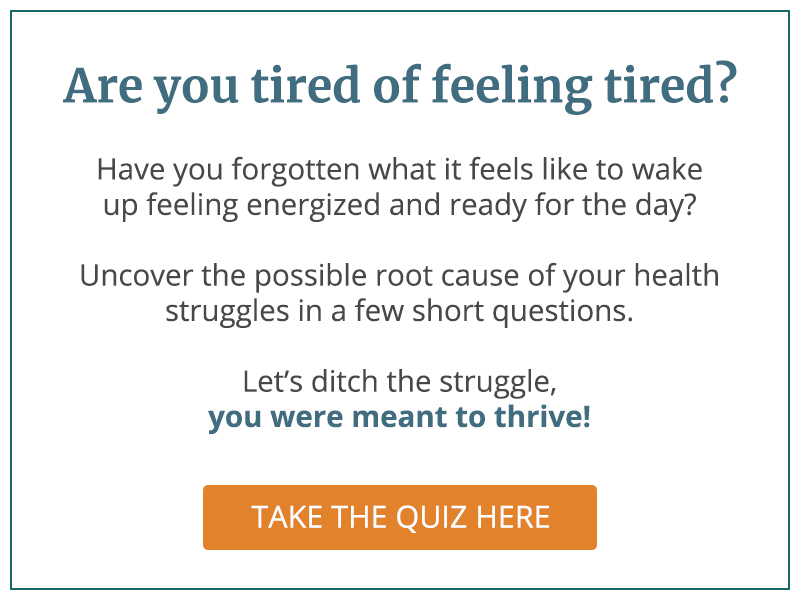You’re doing all the “right” things…
Cutting calories, exercising, drinking plenty of water.
But your weight isn’t where you’d like it to be.
It’s so frustrating!
I completely understand, and I can tell you that many of my patients have felt the same way.
The problem is, so much of what we’ve been taught about weight loss is completely wrong.
For the most part, we’ve been encouraged to swap out our “unhealthy” food choices for lower-calorie versions of the same unhealthy, processed foods. This is not a recipe for weight loss.
We’ve been encouraged to eat every two hours to “keep our metabolism high”…spoiler alert: this is not a good idea if you’re trying to lose weight.
So what do we do instead? What is the formula to get that weight off and keep it off?
Well, that answer can be different for each individual, depending on why the weight is being stubborn, to begin with.
While there’s no one size fits all solution for weight loss, I’m going to explore a few of the reasons you may be struggling to lose those pounds, and what you should do instead.
Insulin Resistance And Weight Loss
Insulin resistance is an epidemic in our country. With 1 out of every 3 adults in the U.S likely experiencing it, it’s a serious problem, since this condition can turn into diabetes.
Insulin resistance can also make weight loss difficult.
While researchers may differ on their opinions as to which came first, the weight gain or the insulin resistance, one thing is clear. Once you have gained weight, if you develop insulin resistance, it’s harder to lose it.
Once your cells become resistant to insulin, you can’t properly utilize the food you’re eating for energy. Insulin resistance can cause fatigue, and make you crave simple carbs…not a great combination if you’re looking to lose weight.
The problem is, most people think they are just supposed to be tired and gaining weight. We are told these are just symptoms of aging and a modern lifestyle. So insulin resistance isn’t caught until later in the stages of the condition.
If you’re trying to lose weight and what you’re doing isn’t working, please take a visit to your doctor and have her test your fasting blood sugar and insulin levels.
If you know that you’re insulin resistant, losing weight can be a huge factor in successfully reversing the condition. It will be more difficult for you, but not impossible. Eating an anti-inflammatory diet and getting plenty of exercise can help bring your weight and your insulin resistance down.
Is Snacking Bad For Weight Loss?
Some time ago, the idea that eating every couple of hours was a good idea to keep the metabolism running properly entered the mainstream media.
Now, if you’re an athlete, someone who trains at the gym 6 days a week, or a cyclist traversing uphill terrain, chances are, you can eat every 2-3 hours and lose weight or maintain your muscular physique just fine.
But for most people, the idea of eating this frequently isn’t a path to weight loss.
This circles back to the insulin problem.
Every time you eat, you’re signaling insulin production. So if you’re eating every 2 hours, you’re constantly spiking your insulin. Which leads to difficulty losing weight.
Ideally, we should eat 2-3 meals per day. At least 4-6 hours apart. And take a nice long break from digesting food overnight.
When we decrease the number of times we’re signaling insulin per day, it lowers blood sugar, and ultimately makes losing weight a little bit easier.
Anti-Inflammatory Diet For Weight Loss
Eating a whole-food, nutrient-dense diet is the key to unlocking vibrant health.
It’s why for the 3rd year in a row, the Mediterranean Diet was named the best diet for healthy eating, diabetes, and was recognized as the easiest diet to follow by U.S. News and World Report.
Even if you’re sticking to a 3 meal per day regimen, unless you’re choosing the proper nutrition, your weight loss will only go so far.
When you fill your plate with plenty of vegetables, beans, legumes, truly whole grains, nuts, seeds, small amounts of high-quality protein, and healthy fats like avocados or olive oil, you will feel so satisfied that making it another 5 hours to your next meal will feel easy.
When you provide your body with the right nutrients, amazing things start to happen.
The problem is, it’s a hard transition to make if you’ve been conditioned to eat a piece of toast for breakfast, a sandwich for lunch and pasta for dinner. It’s even harder if you’ve been taught that diet-friendly foods are low-fat cheese and diet soda.
This is a huge mindset and habit shift that takes some time and careful planning to implement.
Start with choosing a few vegetables that you like and build your meals around them. Remember, you can enjoy them with olive oil which makes those veggies taste delicious.
Too Much Of A Good Thing
Sometimes, we hear the advice to eat less and move more and try to be overachievers.
The average calorie counting calculator or app will recommend a severe decrease in calories in order to get users to experience rapid weight loss (and keep using their product).
However, severely and suddenly decreasing calorie intake can backfire.
When we cut calories too severely, our body can think we’re starving, so it holds on to every single bit of fat we’ve got in order to survive. This can make weight loss difficult. It can cause the metabolism to slow down, and this effect can linger long after the calorie restriction has stopped.
The same goes for overexercising. If we’re dedicating hours each day to the gym and not fueling our workout with a proper amount of calories to compensate for the energy expenditure, our body can interpret this as a major stress. Which in turn makes weight loss more difficult. Or, we exercise, start eating more because we’re hungrier, and end up gaining weight in the process.
Instead of embarking on a grueling fitness routine and cutting back to 1,000 calories per day, try a modest, 10% reduction in calories and a gentler workout. You will still lose weight. And you’ll be significantly more likely to keep it off, which is the ultimate goal.
Conclusion
If you’re one of the many who are struggling to lose weight, please don’t get discouraged.
Losing weight is difficult, but not impossible.
Sometimes, you just need a little accountability and a guide to show you the path others have taken successfully.
If you’re in need of a little weight loss guidance, I’d love to help you find your way to success. Helping others thrive is my mission and my joy. Schedule a consultation with me here so we can talk about your next steps towards vibrant health.
References
“Insulin Resistance & Prediabetes | NIDDK – NIH.” https://www.niddk.nih.gov/health-information/diabetes/overview/what-is-diabetes/prediabetes-insulin-resistance.
“Enhanced insulin sensitivity in successful, long-term … – NCBI.” 19 Jun. 2017, https://www.ncbi.nlm.nih.gov/pmc/articles/PMC5519190/.
“Intermittent Fasting: Is the Wait Worth the Weight? – NCBI – NIH.” 1 Jun. 2019, https://www.ncbi.nlm.nih.gov/pmc/articles/PMC5959807/.
“U.S. News Reveals Best Diets Rankings for 2020 | Press Room.” 2 Jan. 2020, https://www.usnews.com/info/blogs/press-room/articles/2020-01-02/us-news-reveals-best-diets-rankings-for-2020.
“Persistent metabolic adaptation 6 years ….”



